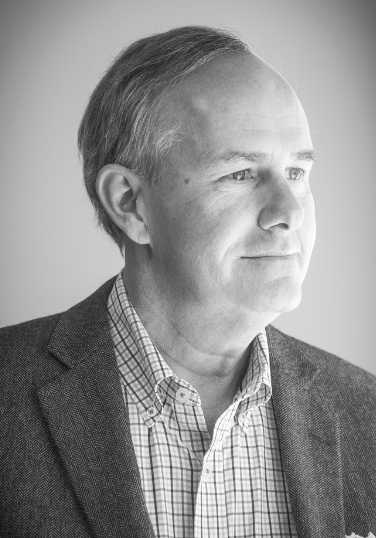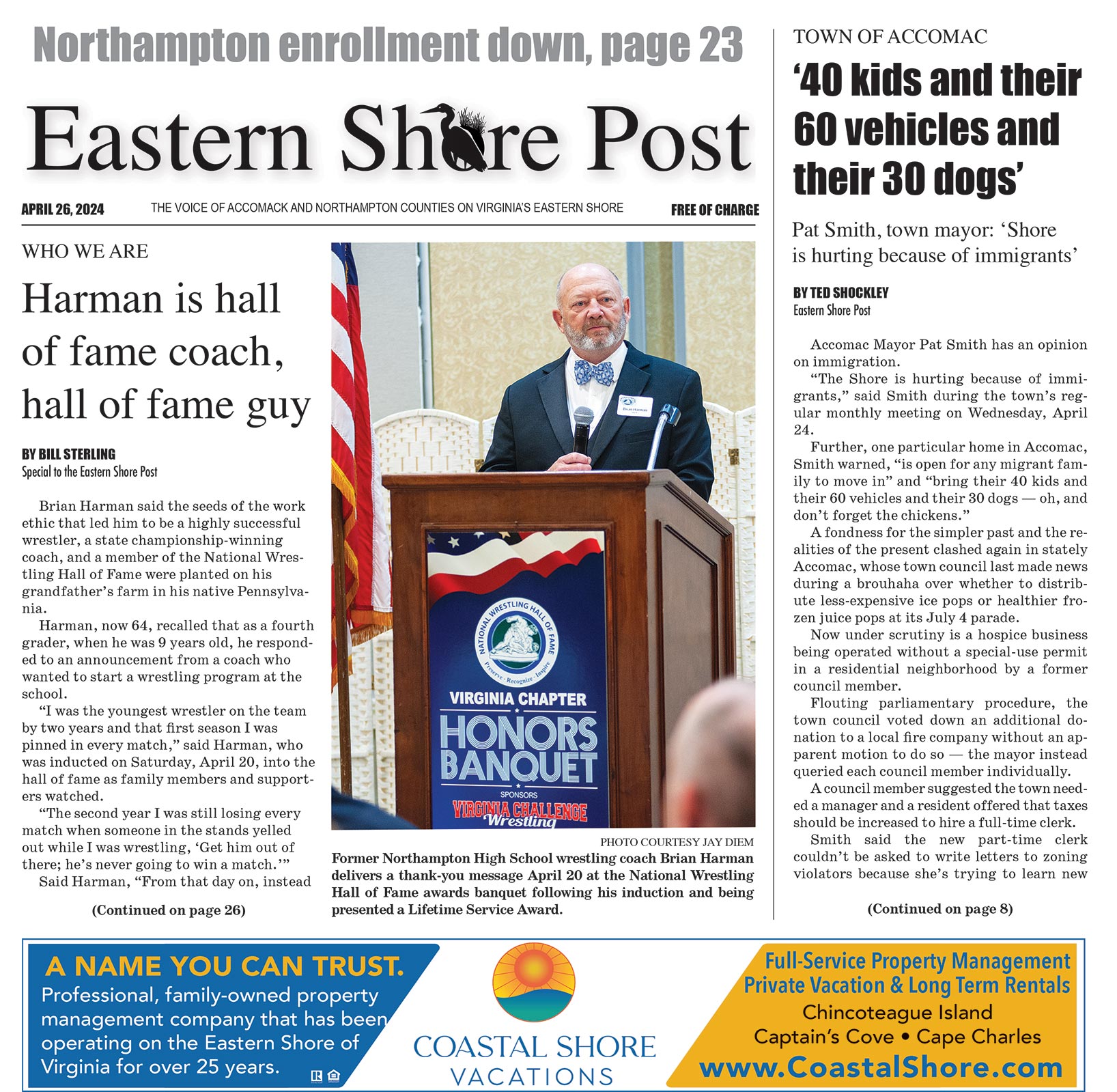BY CAROL VAUGHN, Eastern Shore Post —
The Eastern Shore’s state senator, Lynwood Lewis Jr., remembers well one of the first contentious issues he encountered while serving in the Virginia General Assembly.
“Going back to the beginning, the first big issue I faced in my first or second term was the independence of the Chesapeake Bay Bridge-Tunnel,” he said.
Some legislators were trying to “sort of highjack” the bridge-tunnel, according to Lewis, with bills introduced that would have limited the bridge commission’s power and enabled tapping into its resources for other transportation needs.
The effort was unsuccessful.
Lewis decribed that as “a very stressful time.”
Through the years, Lewis’ work was approved by voters who elected and re-elected him, first to the House of Delegates and then to the state Senate. After two decades in office, he will not seek another term.
The attorney will continue practicing law and looks forward to spending more time with his son, a high school junior, next winter instead of being in Richmond.
Lewis said he wants to thank the people of the Eastern Shore “for their tremendous support over the years and for allowing me to represent them all these years.”
“I hope, as most of us who are elected officeholders hope, that they will remember that we represented them well and we looked out for the interests of our district.”
Lewis, a Democrat, served in the House of Delegates from 2004 to 2014 and then was elected to the state Senate, representing District 6.
In addition to the Shore, the district includes Mathews County and parts of Norfolk and Virginia Beach.
“I’ve always been interested in the entirety of the 6th Senate District and prior to that, the 100th House District, but the Eastern Shore, obviously, to me is a larger part than the population of the Shore relative to the rest of the district. I think we’ve done some good things here over the years and I hope they remember those things,” Lewis said.
Redistricting after the 2020 U.S. census meant Lewis would be in the same new district, Senate District 20, as another incumbent, Republican Sen. Bill DeSteph, of Virginia Beach.
The district leans Republican, according to the Virginia Public Access Project.
Lewis won his last race, in 2019, with 59.66% of the vote, defeating Republican challenger Elizabeth Lankford.
Lewis participated in 100% of floor votes in the 2023 General Assembly session and saw 73%, or 16 of the 22 bills he sponsored, passed, giving him the fifth highest success rate among senators in a session in which 43% of all bills introduced passed, according to VPAP.
Until January, when his successor is sworn in, Lewis will continue his duties, including helping constituents, dealing with governmental issues as they come up, and serving on various committees.
Additionally, the General Assembly will return to Richmond to vote on the budget and for a reconvened session in April, which Lewis said “can be somewhat contentious.”
Lewis received many honors during his career, including Chesapeake Bay Foundation Legislator of the Year (2015); Distinguished Friend of Agriculture, Agribusiness Council Award (2016); Virginia Sheriffs Legislator of the Year (2021); Virginia Seafood Legislator of the Year (2019); and Virginia Soil and Water Conservation Districts Legislator of the Year (2016).
Broadband, spaceport
Along with preserving the bridge-tunnel’s autonomy, broadband infrastructure also was an early effort, starting when Lewis was a delegate and involving getting community leaders to meet with federal elected officials.
“We were one of the first rural areas in Virginia to have significant broadband infrastructure — that was the trunk line that runs down the Eastern Shore,” he said, adding, “Fortunately, (Sen. Mark Warner and then-Sen. Jim Webb) took a really keen interest in the Shore.”
The adminisrations of former governors Tim Kaine and Bob McDonnell also were helpful.
The Mid-Atlantic Regional Spaceport also has been a highlight for Lewis
“Del. (Bob) Bloxom was instrumental in getting (it) formed, but what really got it going was when the folks from Orbital showed up in my office” one February during the Kaine administration.
They told Lewis they were competing to launch missions to supply the International Space Station and “said they’d love to do it from Wallops Island, but we had some infrastructure needs and we had to scramble to figure out a way to somehow, late in the budget cycle that year, try to get a commitment to them for this infrastructure,” he said.
The funding was found and the spaceport continued to advance from that point.
More recently, obtaining cost of competing funding to boost Shore teachers’ pay is an achievement accomplished after years of effort, although it still is on a year-to-year basis.
‘Health of the Bay’
Protecting the interests of agriculture, aquaculture, and the Chesapeake Bay’s health have been priorities — and sometimes those interests were in conflict.
At times it was difficult to communicate to legislators from more urban areas all that’s involved in agriculture and aquaculture.
“I’ve been especially pleased in the last several years to see the Bay folks, particularly the Chesapeake Bay Foundation, and the agricultural community working together on encouraging the use of best management practices — and most importantly, getting funding in the budget for the full cost of implementing best management practices. That’s been a terrific step forward for the health of the Bay … and also helps the agriculture community,” Lewis said.
Among other accomplishments was getting money set aside for dredging state waterways, a “long overdue” effort that continues to be refined.
Increasingly polarized
Lewis has seen politics become increasingly polarized during his time in office.
In 2004, “you could talk past the party levels” to advocate for legislation, he said, adding, “You can’t do that anymore. It is almost impossible to get past the party levels.”
He noted most successful policy initiatives happen closer to the middle ground, rather than on the political fringes.
“I don’t know how we get that back, but we’ve got to figure out a way,” he said.
Priorities for the General Assembly going forward should, as they have in the past, include education and economic development, Lewis said.
Education has made “tremendous strides” through General Assembly actions, Lewis said, including raising teacher salaries, making headway in funding for school construction, and removing the cap on hiring support positions. Still, more needs to be done.
Economic development is another ongoing priority and helps keep Virginians’ taxes low.
“Virginia has generally been ranked as an attractive place to do business and Gov. (Glenn) Youngkin seems to be continuing down that road, which is great, but that is always something you have to be on guard with. You can not let your rankings drop to the point where you cease to be attractive to business.”
Lewis’ advice for his successor is to become familiar with the Shore and to spend time here.
Lewis, in a March 6 letter announcing his decision not to seek re-election, summed up his thoughts this way:
“It has been the honor of a lifetime to serve in the General Assembly, first as a Delegate and, for the past decade, as the Senator from Accomack. I’m deeply proud of what we’ve accomplished over the past many years together; I am grateful to every person who has supported me and those who have worked alongside my office, my campaigns, and me toward the common goal of a better Commonwealth for all Virginians.”



